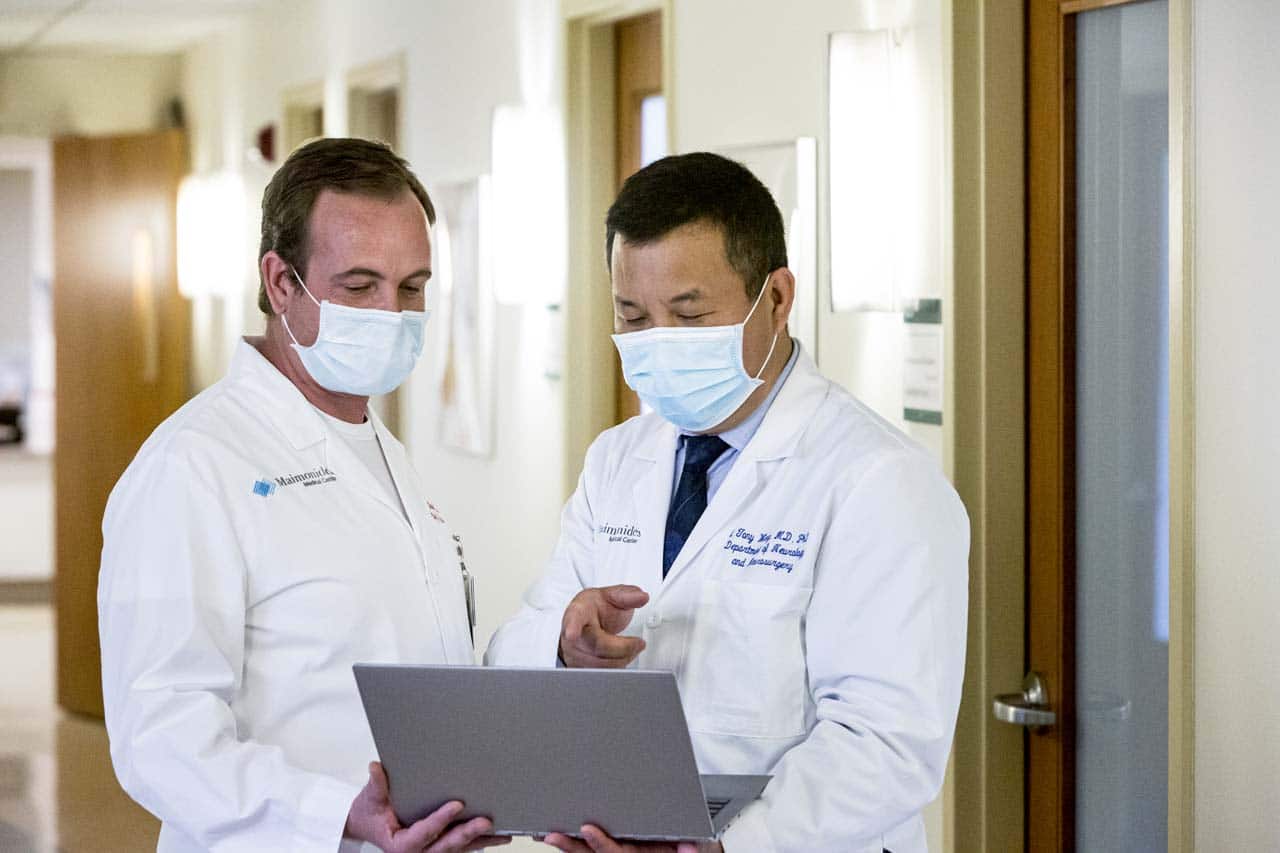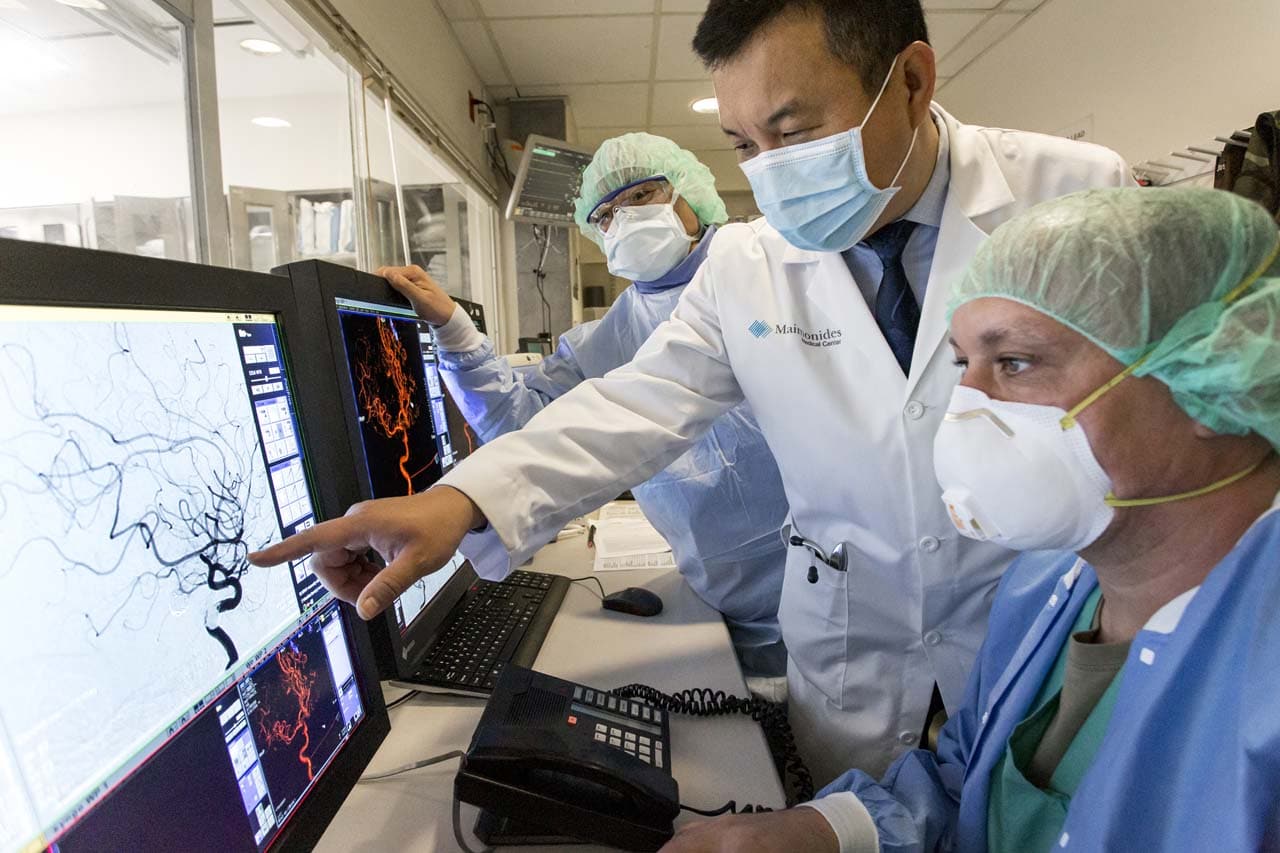EXPERTS AT THE NATIONALLY RECOGNIZED JAFFE COMPREHENSIVE STROKE CENTER AT MAIMONIDES STRESS THE IMPORTANCE OF TREATING STROKE SYMPTOMS FAST
BY JESSICA JONES-GORMAN • PHOTOS BY AMESSÉ PHOTOGRAPHY
According to the Centers for Disease Control and Prevention, stroke kills about 140,000 Americans each year, making the sudden and potentially devastating medical emergency the fifth leading cause of death in the U.S. More than 795,000 people in the United States have a new stroke annually – amounting to one every 40 seconds.
“The most important message I have for the public is this: know the symptoms of stroke, and seek care immediately if you suspect a loved one is having a stroke,” said Dr. Q. Tony Wang, Director of the Jaffe Comprehensive Stroke Center at Maimonides Medical Center in Brooklyn. “The sooner a stroke patient receives care, the better the outcome will be.”

And as the field of stroke care evolves rapidly, it’s also vital to know that the Center is at the forefront of telestroke medicine and other advances in stroke care.
There are only a handful of comprehensive stroke centers in New York City, and Maimonides consistently achieves the best outcomes for patients. In 2019, among the 4,900 hospitals in the U.S., Maimonides was recognized by the federal government for achieving the highest stroke survival rate in New York State and was among the top three in the nation.
“Our patients’ clinical outcomes are so positive because of our team’s expertise, collaboration, and level of training,” noted Dr. Wang, a vascular and interventional neurologist. Dr. Wang leads the team and is himself highly credentialed, with fellowship training in stroke neurology, diagnostic and interventional neuroradiology, and endovascular neurosurgery.
Recognized for 11 consecutive years on the Stroke Gold Plus and Target Stroke “Elite Plus” honor roll by the American Stroke Association, the Jaffe Comprehensive Stroke Center offers multiple state-of-the-art endovascular stroke interventional suites and hybrid operating rooms. Featuring a multidisciplinary team of neurologists, neuro interventional radiologists, neurosurgeons, and neuro intensivists, and in partnership with the Emergency Medicine team, the Center provides advanced comprehensive stroke care with access to all diagnostic tools, including advanced CTA/ CTP and MRI, 24 hours a day, seven days a week.
“We have a superb, multidisciplinary clinical team and a number of resources devoted to stroke specialty care, each of which has been proven to be effective in reducing stroke-related morbidity.”
The Joint Commission designated its highest level of accreditation on the Center as a Comprehensive Stroke Center. Maimonides stroke specialists provide state-of-the-art diagnostic and treatment modalities, including CT angiography, perfusion, MRI/MRA, and neuro endovascular approaches such as stroke clot retrieval, aneurysm coiling, and carotid and intracranial stenting. With these tools and technologies, the team rapidly evaluates and delivers treatment offering patients the best chance of clinical improvement and survival.

“For patients who qualify, clot-dissolving therapy (tPA) can be administered within four and a half hours from the onset of stroke symptoms. In addition to the standard intravenous clot dissolving therapy, new catheter-based techniques are used to directly break up and remove clots within the brain to restore critical blood flow to the brain for up to 24 hours.”
“Our expert team also deploys advanced treatment for hemorrhagic strokes that are caused by bleeding in the brain,” Dr. Wang continued. “We offer 24/7 emergency management of ruptured brain aneurysms or vascular malformations by means of a minimally invasive neuro endovascular approach as well as aneurysm clipping microsurgery for patients requiring such treatment.”
And in this new era of healthcare, stroke patients at Maimonides continue to be cared for safely and separately in designated areas.
“We have instituted a series of changes as we adapted to treating patients during the COVID-19 crisis. Patients are screened, and those confirmed or suspected of having the virus are kept apart from other patients. We thoroughly clean every area, following rigorous disinfection and safety precautions to minimize risk of exposure. We understand many people are apprehensive about visiting hospitals or doctors, but we strongly encourage everyone to not delay their healthcare needs – especially time-sensitive, life-saving stroke care. We are taking all of the necessary steps to keep patients safe.”
Dr. Wang and the staff at Maimonides are also actively studying the link between COVID-19 and stroke, researching every possible correlation.
“We know that COVID-19 can cause ischemic stroke (the ones caused by blood clots), and we’re seeing an uptick in thrombosis and embolisms, so we are constantly evaluating patients and watching for these signs. We have been able to integrate multiple specialties here, opening up the stroke unit and treating patients who couldn’t be taken to the ICU. And we’re using a ‘SUPERMAN’ model to quickly adapt to the rapidly evolving COVID pandemic.”

For Dr. Wang, the development of this type of care is a natural evolution of his years of study and clinical treatment experience. He earned his medical degree from Jiamusi University School of Medicine and Ph.D. in human genetics and molecular biology from Johns Hopkins University. He completed internships in internal medicine at the Albert Einstein College of Medicine and Jacobi Medical Center, as well as research fellowships at Johns Hopkins University.
Dr. Wang also completed a residency in neurology and served as a chief resident of neurology at the Albert Einstein College of Medicine before completing multiple fellowships in stroke/cerebrovascular neurology, diagnostic neuroradiology, and interventional neuroradiology/endovascular neurosurgery at Mount Sinai Hospital in Manhattan.
His decision to pursue this branch of medicine was a personal one.
“When I was ten years old, my grandmother first had an ischemic stroke and then a devastating hemorrhagic stroke,” the doctor recalled. “We took care of her at home, which had a tremendous impact on me. She passed away when I was 12, and I remember feeling so helpless. Because of her experience, I knew I wanted to be a doctor. I wanted to prevent that from happening to someone else’s family.” Also an assistant professor of neurology at SUNY Downstate Medical Center, Dr. Wang joined the stroke team at Maimonides Medical Center in 2018.

“The Jaffe Comprehensive Stroke Center was in existence for 14 years when I arrived. My goal was to build upon the excellent foundation already laid, integrate a residency program, and create a larger presence in clinical research, transforming our Stroke Center into a true academic stroke program.”
The Center has also grown in size over the past two years, expanding from eight to 12 beds, increasing its patient capacity by 50 percent.
“This is a healthcare landmark for the residents of Brooklyn. We have built a leading, nationally renowned stroke program as part of a neurosciences pursuit on this side of the bridge, ensuring quality, world-class care for patients. The best stroke care in the city is now convenient and local. That is extraordinary for New Yorkers.”
The Jaffe Stroke Center at Maimonides
4802 Tenth Avenue / 718.283.7670 maimonidesmed.org/stroke


